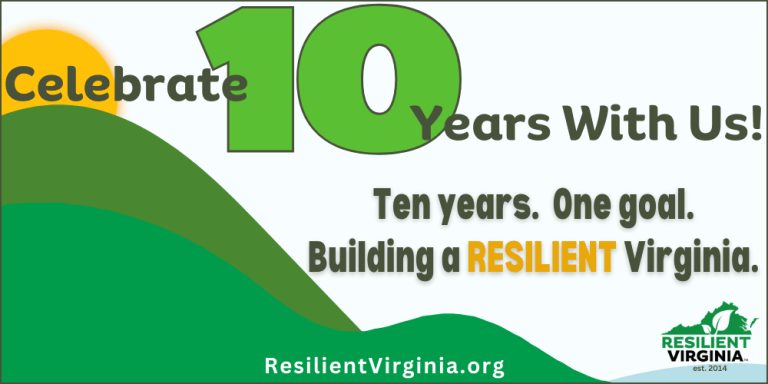
2024 marks Resilient Virginia's 10 year anniversary!
For ten years we have been:
Connecting, Educating, Preparing, and Engaging people in Virginia to move resilience initiatives forward by hosting conferences and academies, publishing reports and case studies, compiling valuable resources, mentoring college students, hosting listening sessions, partnering with community leaders, and working on-the-ground alongside our neighbors. Continue reading to see a few of the highlights from the past decade.
The First Decade
2014: Virginia Sustainable Buildings Network recognized the need to accelerate climate resiliency planning across the Commonwealth and re-imagined the organization to create Resilient Virginia to reflect this change in focus.
![]()
2015: Resilient Virginia held our kick-off meeting featuring Secretary of Public Safety Brian Moran. We also developed a Resiliency Checklist in partnership with Virginia Municipal League/Virginia Association of County’s GoGreen Virginia initiative.
2016: We held our first conference: Activating Communities and Businesses for a More Resilient Future in Richmond. The statewide conference brought together for the first time federal officials addressing climate impact with state emergency management teams, local government representatives, and related organizations.

2017: We held our second conference: Connecting Communities, Business, and Educators for Resiliency Solutions with support from the Secretary of Public Safety and VDEM. The conference focused on resilience planning rationales, tools, and resources.

2018: A visioning/listening session took place that set us on the course of addressing the rural/urban interdependence in climate mitigation and adaptation. This year, we also held the Rural Resiliency Forum.

2019: We held our third conference: Connecting Rural and Urban Communities for a Resilient Future in collaboration with University of Virginia in Charlottesville. The conference highlighted progress and explored the interdependent roles of rural and urban regions.
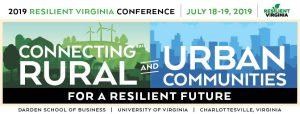
2020: We launched the Resiliency Academy as a virtual series due to COVID. The on-going series features government, business, and organization experts in resilience planning, technology, and funding. The first four sessions were held in 2020 and gave an introduction to four resiliency planning guides.
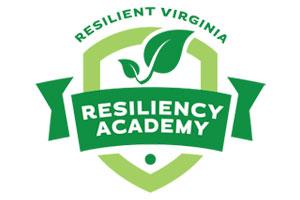
2021: Our Spring Resiliency Academy sessions focused on Financing Resiliency Initiatives. In the summer, we held our fourth conference: From Recovery to Resilience as a virtual event with worldwide attendance. At the conference, we partnered with Leaders in Energy to co-host the Green Jobs Forum and Career Fair. Listening sessions were held in the fall with government, business, academic, and nonprofit organization attendance.
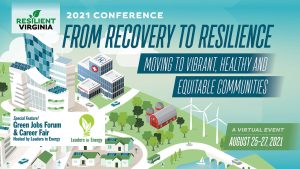
2022: We were awarded the Environmental Protection Agency’s Environmental Justice grant that started the Lynchburg Rising project. Our Spring and Fall Resiliency Academy sessions focused on the components of a resilient community. The Albemarle County Risk Assessment was published, funded by Piedmont Environmental Council and developed by Resilient Virginia and Sobis.
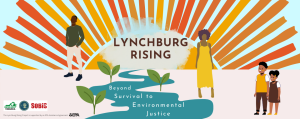
2023: We held our fifth conference: Economic Opportunities for Community Resilience as a hybrid event, with in-person attendance at the University of Virginia. The conference focused on the current wide ranges of federal and state program and funding opportunities. Listening Sessions were held in the fall with government, business, academic, and nonprofit organization attendance. We also launched the Resilient Virginia Collaborative Alliance (RVCA) for Central and Southwest Virginia with funding from the Institute for Sustainable Communities.
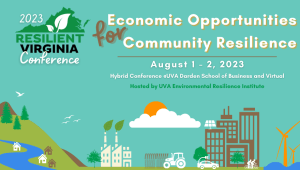
A Look at What We're Working on in 2024
Virginia Energy Resilience Study (VERS): This two-year project with Virginia Energy launched in February 2024 to support energy resilience in underserved communities.
We are planning for a second EPA EJ grant to continue work in Lynchburg.
The RVCA‘s Core Steering Committee is identifying resilience priorities for Central and Southwest Virginia and workgroups will start this Spring.
Virginia Commonwealth University’s Environmental Justice Data Project continues to work with underserved communities in Emporia, Charles City County, and Richmond to identify climate hazard solutions.
The 2024 Resiliency Academy series starts this Spring with support from MARISA. The series will provide training in hazard mitigation planning that addresses climate impact.
Planning for the 2025 Resilient Virginia conference will start later this year.

We are working hard to make the next 10 years even more successful and impactful than the last. If you value the work we do, please consider making a tax-deductible donation, that directly supports our programs.
Your support will help us continue to provide Virginia communities with the assistance they need to become more resilient, healthy, and safe places to live, work, and prosper. Thank you!




